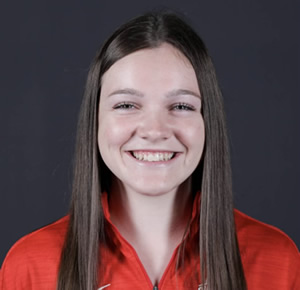Technology and the Future of Nursing
 Kristen Devolve recently graduated from The Ohio State University College of Nursing, feeling better prepared to enter the workforce. That's by design. Ohio State's colleges of Nursing and Engineering are collaborating on a project, funded by the American Nurses Foundation's Reimagining Nursing Initiative, that uses technology-enabled learning tools to ensure students can demonstrate the skills they need post-graduation.
Kristen Devolve recently graduated from The Ohio State University College of Nursing, feeling better prepared to enter the workforce. That's by design. Ohio State's colleges of Nursing and Engineering are collaborating on a project, funded by the American Nurses Foundation's Reimagining Nursing Initiative, that uses technology-enabled learning tools to ensure students can demonstrate the skills they need post-graduation.
Specifically, those tools are extended reality simulations, artificial intelligence, and machine learning. So far, the project Disrupting Nursing Education with XR, AI and ML has engaged more than 600 pre-licensure students in thoughtful immersive experiences and performed more than 1,300 simulations designed to replicate real-world nursing scenarios. Kristen, who now has a Bachelor of Science in Nursing, is one of the students who participated in those simulations.
The Foundation spoke with Kristen about what led her to nursing, extended reality simulations, and her career aspirations.
This interview has been edited for length and clarity.
American Nurses Foundation: Kristen, why did you decide on nursing as a career choice?
Kristen Devolve: One thing that confirmed my decision happened in high school. There was this event that helped raise money for pediatric cancer research. One of the guests had cancer as a child, and she shared her experience and how nurses impacted her care. She said nurses helped her in her fight against cancer—I want to be able to do that for someone else and have that kind of impact. Knowing nurses play a huge role in their patients' lives really stuck with me.
Foundation: That's amazing. How did you end up participating in Ohio State's project and the extended reality simulations?
Kristen: It was part of our community health class. I have a younger sister who is also a nursing student here, and she participated in clinical simulations, too.
Foundation: What are you learning in your community health class?
Kristen: The class exposes students to the different paths nurses can take. We learned about going out into the community to provide care and how to advocate for our patients. We were also exposed to different health care situations we could see in the world.
Foundation: So, you participated in the extended reality simulations in that class, right? Can you talk about that?
Kristen: Yes. So, one of the simulations allowed me to see life as someone experiencing homelessness. I was in a tent, and at one point, police officers came and wanted everyone to leave the encampment.
Foundation: We know the project uses avatars to allow students to work through any biases they might have. What did you take away from that simulation?
Kristen: I learned not to have preconceived notions about people and instead meet them with empathy. I also gained a better understanding of what people are going through and the hardships they face. When we debriefed with our clinical instructor, we spoke about being able to look at the whole picture, so we can provide the support and care different people might need—especially when patients get out of the hospital.
Foundation: How did you feel the simulation better prepared you for practice?
Kristen: Extended reality allowed me to experience things I wouldn't usually see during my nursing education. When I go out into the field, I'll have the confidence to handle complex situations to the best of my abilities versus feeling like a difficult situation is entirely new to me. But I also learned to understand where people come from and what might have led them to me. This really emphasized the importance of getting to know people and their backgrounds.
Foundation: Having participated in this project, what do you think about technology's role in health care and nursing education?
Kristen: I really like the thoughtful use of technology. It can be very beneficial, especially when students are exposed to different clinical settings. Being able to discuss the simulations with our instructors and going over what went right is immensely helpful. Extended reality provides a safe space to make mistakes and learn to do things better.
Foundation: What's next for you? What do you want to do?
Kristen: The goal is to go into pediatrics. Ideally, I would love to work at Cincinnati Children's Hospital. And then eventually, down the line, I'm considering going back to school and becoming a nurse practitioner. That's not going to happen right away, but that is something I want to do in the next couple of years or so.